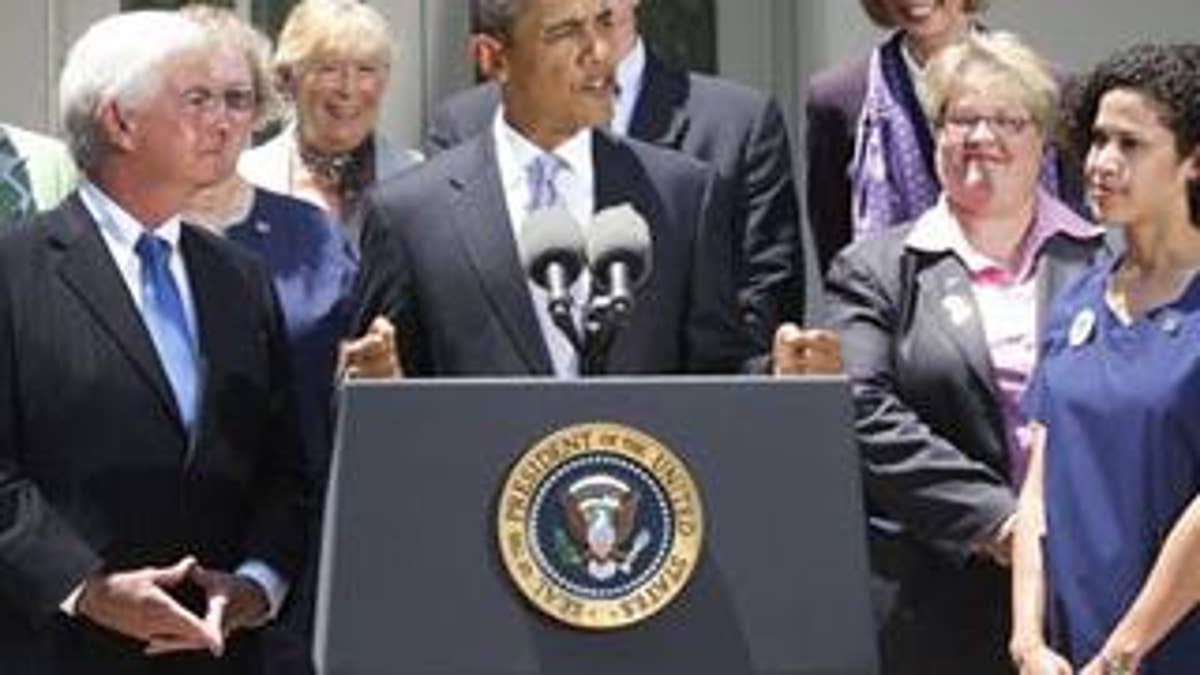
President Obama called on Congress Wednesday to "buck up" and pass a health care reform package, decrying the "naysayers" and the "cynics" for defending what he described as a broken system.
Despite resistance from virtually all Republicans to the latest health care proposals pitched by Democrats, Obama said he was "confident" that Congress could pass out a bill in the coming weeks and declared, "We are going to get this done." He said the American people are on board and are awaiting Washington to take the next step.
The president is trying to build momentum for a comprehensive reform package and short-circuit attempts to delay the bill -- discontent over the package seemed to build as Obama was out of the country last week.
But taking a stern tone, Obama accused his health care critics of "defending the status quo." He said he wants the House and Senate to pass out bills before the August recess, so that they can settle on one unified bill that he can sign shortly after lawmakers return from break.
"This is a problem that we can no longer defer," Obama said, flanked by nurses while delivering the latest in a series of recent pep talks. "Deferring reform is nothing more than defending the status quo -- and those who would oppose our efforts should take a hard look at just what it is that they're defending."
He described the current system as one in which costs are skyrocketing as thousands lose coverage, saying the status quo is "not an option" for Americans anymore.
Obama issued the fresh call for action in the Rose Garden, just a few hours after a Senate panel became the first to act on the president's push for legislation. He used that progress, which he hailed as a "major milestone," to try to pressure other lawmakers to move the ball forward.
"The naysayers and the cynics still doubt that we can do this. But it wasn't too long ago that those same naysayers doubted that we'd be able to make real progress on health care reform. And thanks to the work of key committees in Congress, we are now closer to the goal of health reform than we have ever been," Obama said.
In a party-line vote that reflected deep concerns over costs, the Senate Health, Education, Labor and Pensions Committee voted 13-10 Wednesday, with all Republicans on the committee opposing, to pass a $600-billion version. It would expand coverage by requiring individuals to get insurance and employers to contribute to the cost.
That's just one proposal. The Senate Finance Committee is working out its own bill. And House Democrats have rolled out a bill estimated to cost between $1 trillion and $1.5 trillion over 10 years.
The problem for the White House runs deeper than typical legislative depression and self-doubt, even with the biggest combined Democratic congressional majorities since Lyndon Johnson's presidency. Democrats can't agree on how to pay for health care reform.
The House bill seeks $540 billion in taxes on couples earning more than $350,000 a year. But House Speaker Nancy Pelosi conceded Tuesday that she doesn't yet have the votes to pass the House bill, calling it a draft proposal -- the second to date.
In the Senate, there is hardly any support for a surtax on the wealthy. Obama also has not gone out of his way to endorse that specific idea.
The Senate Finance Committee is scheduled to vote next week on taxes to pay for the Health, Education, Labor and Pension Committee's health reform bill. But the finance committee does not yet have a taxation method politically palatable enough to survive a committee vote.
Meanwhile, the House package is drawing fierce opposition from Republicans who say it costs too much and will create a "web of bureaucracy." But Obama promoted the work that is underway and pushed the House and Senate to press for a final package.
"When this proposal is combined with other proposals that the Senate Finance Committee is working on, it's estimated that health reform will cover 97 percent of all Americans," Obama said in a written statement following the Senate panel vote Wednesday morning. "The HELP committee's success should give us hope, but it should not give us pause. It should instead provide the urgency for both the House and Senate to finish their critical work on health reform before the August recess."
FOX News' Major Garrett contributed to this report.




